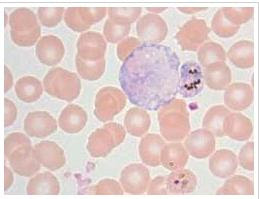First Prevent Malaria Infections Infections Next
First Prevent Malaria Infections Infections Next
A team of researchers has found that the existing malaria prevents subsequent infection by the malaria parasite by limiting the presence of iron in the host liver. This discovery has important implications for treatment and prevention of malaria that affect millions of people around the world.
Malaria Plasmodium
The study was developed by a team led by researcher Maria M. Mota at the Instituto de Medicina Molecular, Lisbon, Portugal, in collaboration with researchers at the Weatherall Institute of Molecular Medicine and Oxford University, and funded by the Portuguese Fundacao Ciencia e Tecnologia a pre, European Science Foundation and the Medical Research Council, UK.
In this new study, researchers focused on how the malaria parasite develops, both in the liver and in red blood cells and analyze the patterns of infection in mice, looking for the special case of "super infection", in which a person is already infected with malaria and then bites by the mosquito that is infected. Someone in high risk areas can be bitten by hundreds of mosquitoes infected with malaria per year, which makes the issue very relevant super infection. The study for the first time reveal the vital role of iron in the development of a malaria infection, which has strong implications for iron supplementation to combat anemia in malaria endemic areas.
After a mosquito bite, malaria parasites to the liver first, a lot, then go out and attack the red blood cells. Previously known that the parasites in both the liver and in blood need iron to grow. This new study shows that the two mosquito bites a person who is carrying blood parasites, did not result in full blast a second infection. Super infection in the liver is blocked by the first infection. This protective effect caused by blood parasites causing the parasites in the liver to iron out, therefore they can not grow. Therefore, the results obtained dubious biological concept that infection of different host cells (hepatocytes, liver or red blood cells) occur independently of each other, which also has an impact on areas of study that exceed the malaria infection.
Dr. Silvia Portugal, the first investigator on the study said: "I am very pleased we were able to find such interesting interactions occur between the stages of malaria parasites on one host is different, and this may contribute to malaria control in the future."
Dr. Maria Mota, who led the study at the Instituto de Medicina Molecular in Lisbon says: "Our findings help explain the differences in infection risk and complexity of infections in young people observed in malaria endemic areas who have a speculative explanation is needed to at this time. After all, they doubt the idea that the infection in different cell types occur independently, which may impact on future research in the field of infectious diseases as a whole. "
Dr. It Drakesmith who collaborated in the study leads Weatherall Institute of Molecular Medicine adds: "Now that we understand how malaria parasites protect their territory in the body of parasites, competitors, we may be able to enhance this natural defense mechanism to combat the risk of infection- malaria infection. At the same time we need to look back on the feasibility of iron supplementation programs in malaria endemic areas, as it increases the risk of possible infection need to be weighed against the benefits gained. More data is needed for this problem. "
Malaria is a destructive disease that affects extensive areas of Africa, Asia, Central and South America, causing several thousand deaths per year in children under five years. Malaria is caused by infection with parasitic protozoa Plasmodium, which belongs to the type of Apikompleksa. Experiment to eradicate malaria have so far not been successful. Such failures can be attributed to the increase in insecticide resistance in mosquitoes and the anti-malarial drugs on the parasite. There is an urgent need for developing new strategies against malaria.
The findings were published on May 15, 2011 in Nature Medicine.


0 Responses to “First Prevent Malaria Infections Infections Next”
Post a Comment